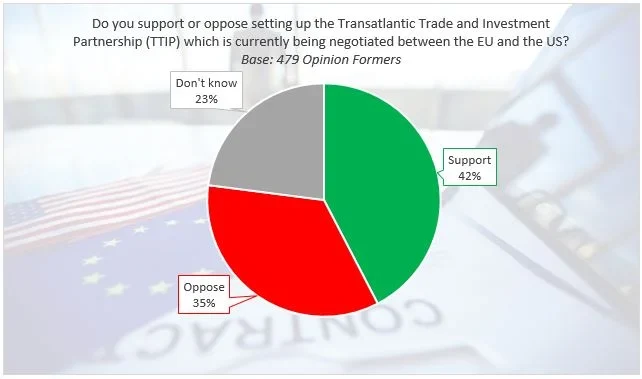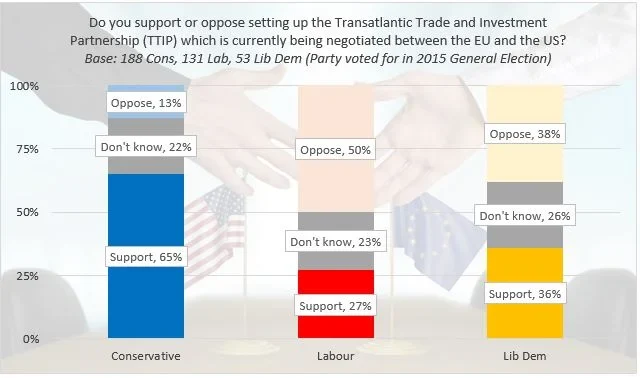Despite limited press coverage, the Transatlantic Trade and Investment Partnership (TTIP) - a proposed free trade agreement between the European Union and the United States - has proved to be a polarising subject. Proponents argue that increased free trade is good and that TTIP will promote multilateral economic growth. However, critics argue that it will increase corporate power and make it difficult for governments to regulate markets for public benefit. YouGov was keen to assess the level of support for such a deal amongst its UK Opinion Formers panel - which draws leaders from the worlds of business, politics, the media, charities, public sector and academia among others.
Opinion Formers are broadly divided on the question of whether they support or oppose the agreement. Two-fifths (42%) of them support the implementation of TTIP compared to 35% who oppose it. A quarter (23%) are unable to say whether or not they support TTIP, perhaps reflecting the relatively limited coverage the proposed agreement has received in the media.

Analysis of the data along party lines indicates that Opinion Formers who voted Conservative at the 2015 General Election are much more likely to support TTIP (65%) than those who voted Labour (27%). Indeed, 50% of Labour voting Opinion Formers oppose its implementation. Liberal Democrat voters are the most split; 36% support the agreement whereas 38% oppose it, leaving a quarter (26%) who don’t know either way.

YouGov followed up with an open ended question asking why respondents selected the answer they did, with a prevalent view among supporters emerging that:
“All partnerships aimed at boosting trade should be encouraged”
Supportive Opinion Formers also recognise the benefits to the UK the deal could bring, in particular assisting “UK companies to access the markets in the USA”. Some Opinion Formers also mention a larger spectre of competition emanating from Asia, feeling TTIP will guard against the “danger of a US pivot to Asia which will leave us ignored”.
Other TTIP supporters see it as synonymous with something much grander and intangible, that it “will help to retain the initiative and leadership of the West on international economic issues including rules and governance”. Certainly, there is a wish among certain members of the panel to strengthen the Atlantic link between Europe and the US, with the EU and US needing to “work together and co-operate wherever possible to ensure the wealth and stability of the free world”.
However, on the other side of the argument we find that suspicions over the agreement typically emanate from the secretive nature of negotiations and a concern that it will pass “power to undemocratic corporations” rather than any particular aversion to free trade. Those opposing “do not like the lack of transparency of negotiations”, feeling “the process so far has been opaque” given most of what we currently know about TTIP has come from leaks.
Said leaks have given rise to fears that the agreement will “open the way to total privatisation of all public services”, including the NHS. This stems from one provision the TTIP is purported to provide in the form of Investor-State Dispute Settlements (ISDS), which would allow companies to sue governments if their policies cause a loss of profits. Thus, unless certain elements of the public sector are specifically protected in the final agreement, there is a very real fear it could “undermine the NHS [and] could allow commercial global companies to sue the government for taking important public health measures that would cut their profits”.
And it’s not just public sector services Opinion Formers opposed are worried about. Food, environmental and banking sectors could also be in for some potentially significant changes. Currently, the EU has tough restrictions on GM food, however if regulations are lifted there is a fear “GM and other threatening products could enter our markets”. Concerns that “TTIP would un-do environmental protection currently enforceable in the UK” and the “levelling down of financial services regulations in the US” (which are currently stricter than in the UK as an effort to avoid another occurrence of the 2008 crash) are also cited by Opinion Formers wary of the deal. Moreover, there is a feeling that any deal will “only be geared toward the US gaining more”, or that TTIP “gives too much power to transnational corporations; they could effectively hold democratic governments to ransom”.
Indeed, the views of those who both support and oppose TTIP really do bring light to where the debate lies. With a deal which could directly affect nearly a billion people, it is no wonder Opinion Formers hold such strong views. Without a draft agreement available to the public however, and none expected until the final version is released at the end of negotiations to be put before the European Parliament, it is difficult to assess exactly what impact TTIP, if passed, will have. Although as one Opinion Former succinctly put it, “with robust safeguards, it could be a way of opening up trade and business opportunities”.
YouGov completed online interviews with 479 opinion formers from its UK Opinion Formers Panel. Opinion Formers are leaders in their field from business, media, politics, NGOs, academia and beyond. Fieldwork was undertaken between 17th June and 1st July 2015. The figures have not been weighted.








